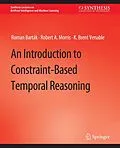Solving challenging computational problems involving time has been a critical component in the development of artificial intelligence systems almost since the inception of the field. This book provides a concise introduction to the core computational elements of temporal reasoning for use in AI systems for planning and scheduling, as well as systems that extract temporal information from data. It presents a survey of temporal frameworks based on constraints, both qualitative and quantitative, as well as of major temporal consistency techniques. The book also introduces the reader to more recent extensions to the core model that allow AI systems to explicitly represent temporal preferences and temporal uncertainty. This book is intended for students and researchers interested in constraint-based temporal reasoning. It provides a self-contained guide to the different representations of time, as well as examples of recent applications of time in AI systems.
Autorentext
Roman Bartak is a professor at Charles University, Prague (Czech Republic). He leads the Constraint Satisfaction and Optimization Research Group that performs basic and applied research in the areas of satisfiability and discrete optimization problems. His work focuses on techniques of constraint satisfaction and their application to planning and scheduling. The research results are used in products of ILOG, Visopt, and ManOPT/Entellexi. Professor Bártak is teaching courses on artificial intelligence, planning, scheduling, and constraint programming at Charles University and he presented several tutorials on these topics at major conferences such as IJCAI, AAAI, ICAPS, SAC etc.; he is author of the On-line Guide to Constraint Programming (#2 source for Constraint Programming in Google).
